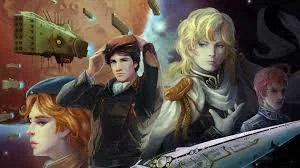Japanese anime is now internationally mainstream, including In the United States. At one-point anime was watched by only a small “geeky” segment of the population here but is now consumed by many, of all ages. Americans of all types, from jocks and business professionals to military personnel, frequently tell me they watch anime.
Favorites many point to include Dragon Ball, Naruto, and Death Note, among a host of others. You see people with Goku t-shirts in NYC all the time.
One anime no one brings up as their favorite to me, however, is the Legend of the Galactic Heroes.
This is my favorite. I watched my share of anime growing up in Japan. Out of all the ones I watched, this series particularly stands out in my mind.
Based on a science fiction novel series by Yoshiki Tanaka, the anime version debuted in 1988. The final episodes were published in 2000, totaling 110. During my adolescence this show was an obsession with me, and it cemented my interest in international affairs and geopolitics.
Americans have never heard of this series for the most part, even the ones who consume anime on a regular basis. Described as a “Space Opera,” it is science fiction. But this is not your typical science fiction.
There are no aliens. Only humans who spread out throughout the galaxy. There is nothing supernatural, like “the Force” in Star Wars. The main characters are not on a galactic adventure, as in Star Trek.
The series is about politics and war. Age-old questions humanity face, set in the future.
The series begins over 800 years in the future with humanity having colonized much of the galaxy. However, war as a societal phenomenon continues despite technological progress.
The galaxy is split in two opposing sides: the democratic Free Planet Alliance and the autocratic Galactic Empire have been at perpetual war for over 150 years with no end in sight. You follow two protagonist geopolitical and military geniuses, Yang Wen-li and Reinhard von Lohengramm, who quickly rise up the ranks to fame and power and alter the dynamic of the stalemate. The two become mortal rivals who at a deep level respect one another.
When admirals are not directing battles involving hundreds of thousands of ships and millions of military personnel utilizing cunning strategies reminiscent of my favorite Chinese geopolitical historical fiction The Romance of the Three Kingdoms, political intrigue runs amok as Machiavellian players strive to outmaneuver one other.
The central philosophical question that threads the entire series together is which is superior: a corrupt democracy, or an efficient autocracy.
Which is one reason I believe this series never took off in the States. Democracy is an unquestioned ideal to many in America. Americans would tend not to favor a show that does not put on a pedestal what Americans consider a political system that represents an universal ideal and an answer to much of the world’s political problems.
Many Americas would also consider this series boring. There are entire episodes where only two, three key characters are in conversation with no movement or action, only the animated discussion of ideas. Americans are used to Marvel Comic type shows where strong individuals are in perpetual action. Many would probably rather not watch 30 minutes of political philosophy being discussed as an entire episode.
But this is why I love this series. Intelligence, teamwork, strategy, and talent are valued. Rash actions by individuals not so much. The series, despite being a science fiction anime, is steeped in realism. Millions die in battles, and in the galaxy only the fittest--the most cunning--can survive.
This series reflects our current world. Russia and China, dominant autocracies, have allied and are making formidable gains throughout the world, from Ukraine and Syria to throughout Eurasia and Latin America. The Mueller Report confirms that Russia did indeed conduct a “a social media campaign designed to provoke and amplify political and social discord in the United States…[that] by early 2016 favored candidate Trump and disparaged candidate Clinton,” taking advantage of our democratic process for political gain. As of the writing of this blog the Trump administration seems outmaneuvered by Iran (more of a theocracy than an autocracy, but still the government wields rigid control) in the Persian Gulf, though to be fair events have yet to be played through to the end. President Obama faced challenges by a Republican-dominated Congress that tied his hands in both domestic and foreign policies. Putin and Xi face no such hurdles as autocratic leaders.
I do not much watch anime anymore. Still, my life and career would have been fundamentally different if it weren’t for the Legend of the Galactic Heroes. I would not have pursued a career in international affairs otherwise.
A recent remake of this series is now available. Check it out!

